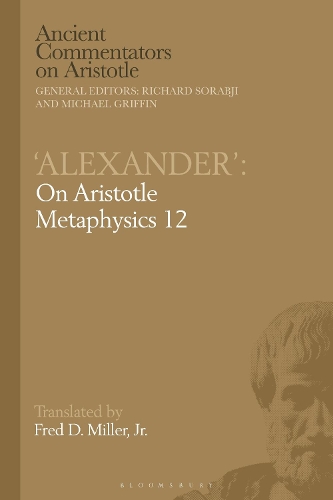
'Alexander': On Aristotle Metaphysics 12
(Hardback)
Available Formats
Publishing Details
'Alexander': On Aristotle Metaphysics 12
By (Author) Professor Fred D. Miller
Bloomsbury Publishing PLC
Bloomsbury Academic
6th May 2021
United Kingdom
Classifications
Tertiary Education
Non Fiction
Philosophy: metaphysics and ontology
Ancient, classical and medieval texts
110
Physical Properties
Hardback
272
Width 156mm, Height 234mm
558g
Description
This volume presents a commentary on Aristotles Metaphysics Book 12 by pseudo-Alexander in a new translation accompanied by explanatory notes, introduction and indexes. Fred D. Miller, Jr. argues that the author of the commentary is in fact not Alexander of Aphrodisias, Aristotles distant successor in early 3rd century CE Athens and his leading defender and interpreter, but Michael of Ephesus from Constantinople as late as the 12th century CE. Robert Browning had earlier made the case that Michael was enlisted by Princess Anna Comnena in a project to restore and complete the ancient Greek commentaries on Aristotle, including those of Alexander; he did so by incorporating available ancient commentaries into commentaries of his own. Metaphysics Book 12 posits a god as the supreme cause of motion in the cosmic system Aristotle had elaborated elsewhere as having the earth at the centre. The fixed stars are whirled around it on an outer sphere, the sun, moon and recognised planets on interior spheres, but with counteracting spheres to make the motions of each independent of the motions of others and of the fixed stars, thus yielding a total of 55 spheres. Motion is transmitted from a divine unmoved mover through divine moved movers which move the celestial spheres, and on to the perishable realms. Chapters 1 to 5 describe the principles and causes of the perishable substances nearer the centre of the universe, while Chapters 6 to 10 seek to prove the existence and attributes of the celestial substances beyond.
Reviews
Millers translation is clear, and the English flows naturally. Moreover, he has enlarged Michaels lemmata, so that the reader can see what is being commented on. Copious notes provide further help, and there are useful indexes and appendices. * The Classical Review *
Author Bio
Fred D. Miller Jr. is Research Fellow at the University of Arizona, USA and Professor Emeritus of Philosophy at Bowling Green State University, USA.
